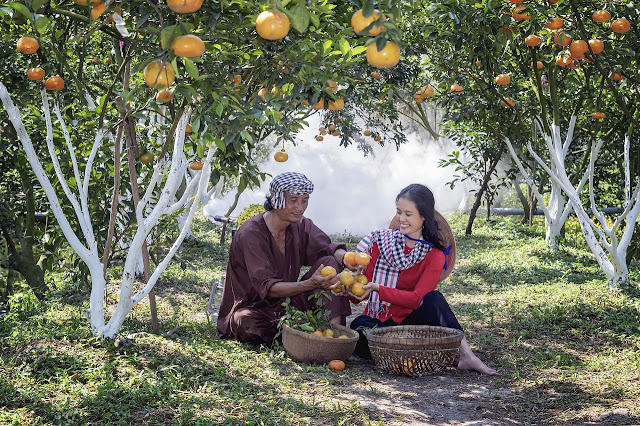 |
| Perennial Crop |
Perennial crops, unlike annual crops, have a lifespan that extends beyond a single growing season. They offer a multitude of advantages for farmers, the environment, and sustainable agriculture as a whole. In this comprehensive guide, we will delve into the benefits of growing perennial crops and provide valuable insights and practical tips for successful implementation. Join us on this journey as we explore the remarkable world of perennial crops and their transformative potential in agricultural practices.
Enhanced Soil Health:
Perennial crops play a pivotal role in building and maintaining healthy soils, which form the foundation of successful farming. Let's explore some key aspects of how perennial crops contribute to soil health:
a. Soil Structure and Erosion Prevention: The extensive root systems of perennial crops improve soil structure, creating a network of channels that enhance water infiltration and reduce the risk of erosion. This leads to better soil stability and nutrient retention.
b. Nutrient Cycling and Fertility: Perennials have efficient nutrient cycling mechanisms. They accumulate nutrients during their growth period and release them back into the soil when their leaves and stems decompose. This natural process helps maintain long-term soil fertility, reducing the need for synthetic fertilizers.
c. Carbon Sequestration: Perennial crops are powerful allies in the fight against climate change. Through their extensive root systems, they capture and store significant amounts of carbon dioxide from the atmosphere, helping to mitigate greenhouse gas emissions and combat global warming.
Biodiversity and Habitat Conservation:
Perennial crops provide an ideal environment for biodiversity to thrive. Here are some ways in which they contribute to biodiversity conservation:
a. Wildlife Habitat: The diverse structure and longer lifespan of perennial crops create habitats that support a wide range of beneficial insects, pollinators, birds, and other wildlife. These crops act as havens for biodiversity, promoting ecological balance in agricultural landscapes.
b. Native Plant Conservation: Many perennial crops are native or adapted to specific regions, making them an excellent choice for preserving and promoting native plant species. By cultivating these crops, farmers contribute to the conservation of local genetic diversity and support the natural ecosystems.
c. Pest and Disease Resistance: Perennial crops often possess natural resistance to pests and diseases. Their ability to coexist with beneficial organisms and build healthy soil ecosystems helps reduce the reliance on synthetic pesticides, promoting ecological pest management strategies.
Water Conservation:
Water scarcity is a pressing issue in many regions. Perennial crops offer significant benefits in water conservation:
a. Reduced Water Requirements: Compared to annual crops, perennials generally have lower water needs. Their deep root systems enable them to access groundwater reserves, reducing irrigation demands and making them well-suited for arid or water-stressed regions.
b. Soil Moisture Retention: The extensive root networks of perennial crops help retain moisture in the soil, improving its water-holding capacity. This enhances resilience during dry periods, reduces the risk of drought stress, and contributes to water conservation efforts.
Long-Term Economic Sustainability:
In addition to their environmental benefits, perennial crops offer economic advantages for farmers:
a. Lower Input Costs: Once established, perennial crops require less frequent replanting and reduced inputs like seeds, fertilizers, and pesticides. This results in cost savings and a more sustainable economic model for farmers.
b. Increased Market Opportunities: Perennial crops, such as fruits, nuts, and perennial grains, often command premium prices in niche markets due to their unique characteristics and flavors. Farmers who embrace perennial farming can tap into these market opportunities and diversify their income streams.
c. Resilience to Climate Variability: Perennial crops have the advantage of adaptability. Their deep root systems and long lifespan allow them to better withstand extreme weather events and adapt to changing climatic conditions. This resilience is crucial in the face of climate change uncertainties.
Conclusion:
The cultivation of perennial crops brings a multitude of benefits, ranging from improved soil health and biodiversity conservation to water conservation and long-term economic sustainability. By incorporating more perennial crops into agricultural systems, we can create resilient and environmentally friendly farming practices that support both farmers and the planet. Thank you for joining us on this exploration of the incredible world of perennial crops and their transformative potential in sustainable agriculture.
Thank you for visiting Vantika Tech!
#perennialcrops #soilhealth #biodiversityconservation #waterconservation #carbonsequestration #sustainableagriculture #economicresilience #nativeplants #pestresistance #climateadaptation #sustainablefarming #regenerativeagriculture #ecologicalfarming #soilconservation #wildlifeconservation #climateaction #biodiversity #watermanagement #agroforestry #permaculture #carbonstorage #foodsecurity #agriculturalsustainability #environmentallyfriendly #resilientfarming #farmlife #agriculturalinnovation #climatechangeadaptation #soilhealthmatters #ecosystemservices #foodsystems #rurallife







No comments:
Post a Comment